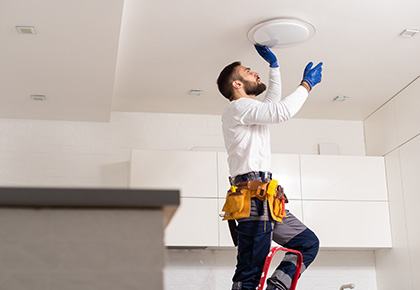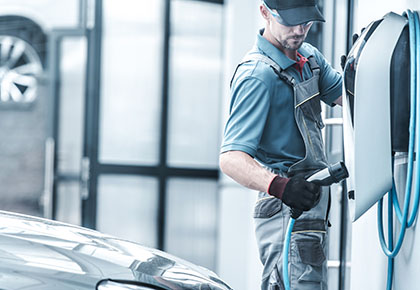-
How to increase HOA and community volunteerism
Regardless of the size of your community, or where it’s located, there is always one thing that every community association board and committee needs: resident volunteers. Unfortunately, however, volunteers are often a scarce resource. -
Keeping HOA and Condo Common Areas Clean During the Coronavirus Pandemic
During these unprecedented times, residents are spending the majority of their time at home to prevent the spread of COVID-19 and protect themselves and their loved ones from infection. One of their primary contact points with the outside world is in your HOA or condo common areas, where they can be at risk of contact with lingering coronavirus or even spread existing virus to other areas of the property. Read on for a comprehensive list of places to clean and how to clean them. -
Fall tips for homeowners: Your comprehensive checklist
Whether your HOA is self-managed or professionally managed, getting started on your fall and winter prep will help keep your operations running smoothly as the seasons and temperatures change – and that will keep your residents happy as well. -
Making a Difference One Face Mask at a Time
Learn how associates, residents and board members are making a difference in their communities, one face mask at a time, during the COVID-19 pandemic. -
Three things to know about community maintenance
Whether your community is self-managed or professionally managed, maintenance is a big part of the day-to-day responsibilities. It’s a responsibility that can quickly become overwhelming, especially when you walk in on a Monday morning to a list of what went wrong over the weekend. -
Tips for community waste management in your association
With a growing focus on proper environmental stewardship, many associations are working toward implementing green initiatives. But getting there can be daunting. With so many programs and opportunities available for all of us to reduce, re-use and recycle, it’s hard to know where to begin. -
How to handle mold in your association
No one wants to find mold in their home or any association building. Unfortunately, mold is ubiquitous – it’s in the air and in the water, and when given the chance, it spreads like crazy. Learn steps to prevent mold or to have it assessed and properly treated, preserving your buildings and the health of your residents. -
Monster Meetings - Stick to the Rules to Control Meetings
While association meetings usually run smoothly, Board members with differing opinions and agendas can create tension and stress. The good news is that by following standard procedure protocols, Board meetings can be run without a hitch. In this article from chicagocooperator.com, FirstService Residential VP Patricia Bialek of Illinois summarizes "Roberts Rules of Order" and explains how Board presidents can use them to keep meetings under control. -
Pros and Cons of Do It Yourself Repairs and Maintenance
FirstService Residential's Bill Worrall discusses the hidden costs of DIY maintenance and repairs and provides great insight into how boards can determine what can be done in house and what should be subbed out to appropriate contractors. -
Put an Energy Saving Program Together for a Multifamily Property
Many HOAs and community associations would like to save energy and energy spending, but they think that putting an energy management plan into place for their multifamily property is difficult to accomplish. FS Energy's Chris Normandeau explains some basic, easy-to-do steps that can make a real impact on an association's energy usage and budget. -
Hiring a reserve study company: Five things to know
In our guide to capital improvements , reserve studies and their relationship to capital improvements and preventive maintenance were discussed at length. -
Fighting mold in your condo or HOA: A step-by-step guide
It’s the scourge of households everywhere: the unsightly, unsanitary, unbecoming sight of mold. But waging war on mold means more than launching a full-scale assault when you see it (though that can be part of the battle plan). Instead, consider a comprehensive strategy – here are some tips to help you get started and steer clear of mold. -

5 energy conservation strategies for community associations
In this article, we delve into the significance of energy conservation within community associations, exploring its benefits and strategies for effective implementation. -
Energy efficiency tips for winter
So what can condo boards or community associations do to mitigate or even reduce costs this winter? Let’s start with what you can do in the summer and fall, before winter actually begins. This includes cleaning, tuning and performing any necessary repairs to heating systems, furnaces and boilers to make sure they won’t be working longer, harder or less efficiently than they should. Other pre-winter tasks include cleaning gutters to remove leaves and debris to ensure water can flow freely. Otherwise, water can become trapped and freeze, which can not only damage your property’s gutters, but also cause ice dams and possible roof leaks. -

Benefits of HOA parks and playgrounds
HOA community playgrounds and HOA parks can offer a great deal for your residents. They can serve as vibrant hubs, fostering a sense of unity and togetherness among homeowners of all ages. They offer more than just a place to play. They create a shared space for everyone to enjoy. -

What to know about condo EV charging
If your high-rise condo is ready to start looking into electric vehicle charging stations, these steps can provide a holistic overview of the process and what you can expect. -
What is a fire hydrant? What to know about community fire hydrants
Aside from knowing to not park next to one, how deep is your knowledge of fire hydrants? Unless you’re a firefighter, it’s probably not that extensive. This may not be a problem... until the unthinkable happens and you need to be confident that your fire hydrants are in good working order. But like any equipment in your community, fire hydrants need to be maintained. -
Six ways to maximize your community committees
Community members join committees because they want to make a difference. That’s great, but sometimes, as they say, life gets in the way. Let’s not forget that committee members are all volunteers, which means it might take something a little extra to keep them motivated. -
Socially Distant Celebration During COVID-19
Learn how community members are making a difference in their communities with socially distant celebrations during COVID-19 spring holidays. -
Starting a neighborhood watch program? Understanding neighborhood watch rules and duties
Neighborhood Watch programs can provide significant benefits to communities – after all, they boost community awareness, communication and involvement, while reducing opportunities for neighborhood crimes to occur. But if you’re interested in getting started, there are many important factors to consider. Here’s an overview. -
Creating effective association committees: Five key steps
All homeowner and community associations are different from one another, as they are comprised of a collaborative group of board members. Just as associations differ so do the special committees that fall under the association. You can have as many different types of experiences with committees as there are kinds of committees themselves. -
HOA committee guidelines to avoid chaos
Community committees are a great way to involve more residents in the activities of their homeowner association, help ensure the rules and regulations of the association are followed, and help lighten the workload of volunteer board members. Some common committees include beautification, architectural, landscaping and grievance committee. At their best, committees are finely tuned engines for getting things done in your community. When there is a breakdown or discord, they’re agents of confusion, wreaking havoc on progress and operating as the figurative wrecking balls for a few overbearing committee members. -
Three residential drainage problems and their solutions
Unless you live in an area where it hardly ever rains (in which case you have a whole other set of problems), drainage will be an issue in your community. Proper drainage is, of course, the answer, but getting there means you have to meet stringent requirements throughout different areas of your community. -
Tips for an eco-friendly building: Sustainable high-rise living
Many multifamily properties and high-rises want to implement “green” living practices and create eco-friendly communities, but not everyone knows where nor how to get started. Here are some effective and easy tips to help you be proactive and successful in achieving your sustainability goals. Read on for a list of programs and services that can be put in place in your community at little to no cost.